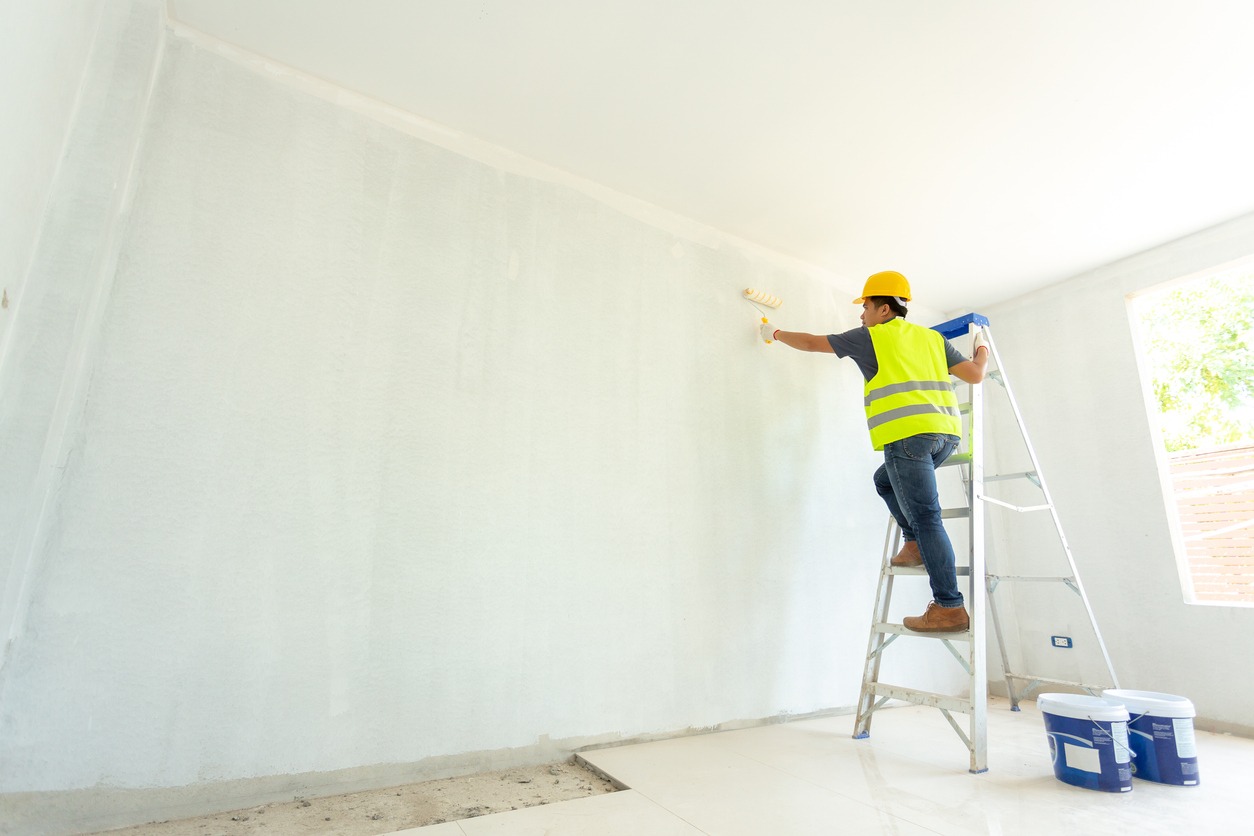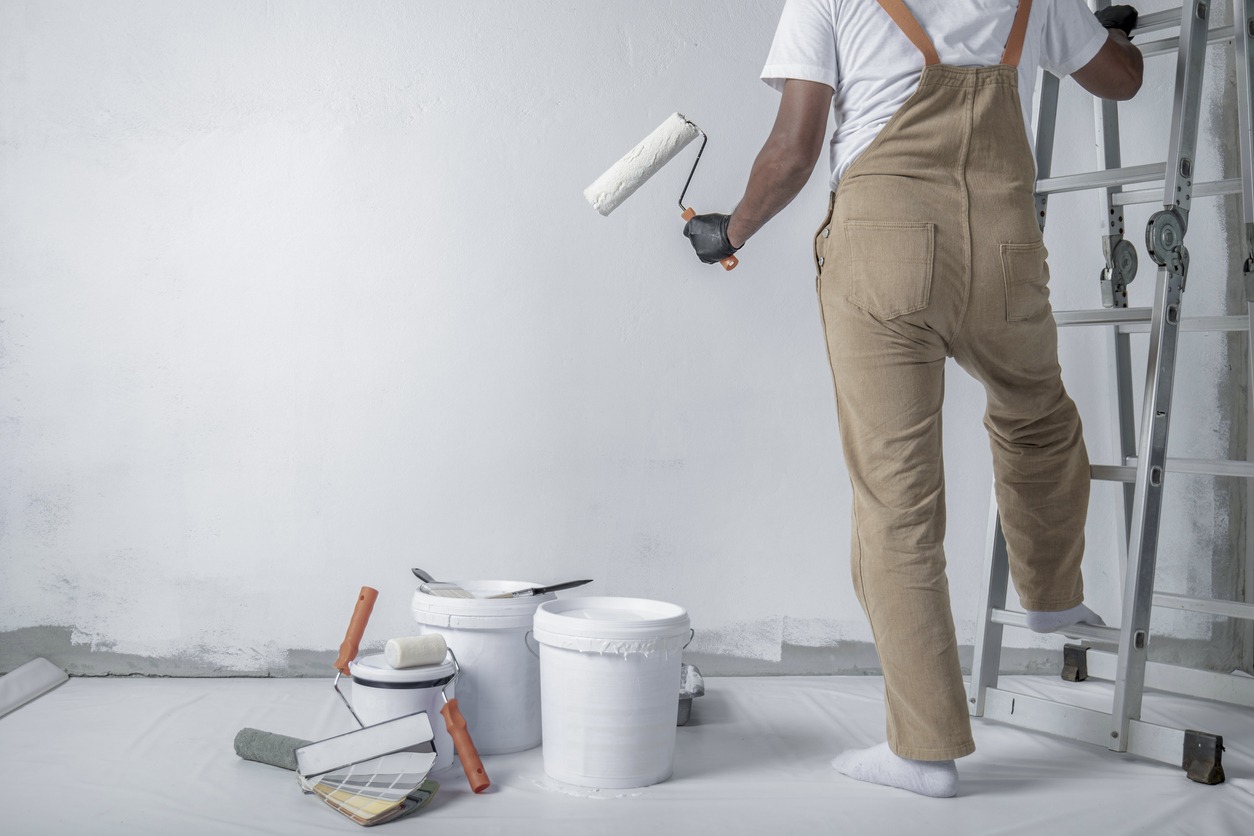When hiring a commercial painter, it’s important to ask the right questions. These questions will help you have a better understanding of the painter’s experience, methods, and reliability. Read on as we cover the essential questions to ask before making your decision to hire commercial painters for your painting project.
What Do Commercial Painters Do?
Before we get into the questions, it would be better if we could first discuss what commercial painters actually do.Commercial painters usually work on large-scale projects, often in businesses, factories, or other commercial spaces. Here’s a look at what they do:
- Surface Preparation: This involves cleaning, sanding, and priming surfaces to make sure the paint adheres properly.
- Applying Paint: Using brushes, rollers, or spray equipment, they apply paint to walls, ceilings, and other surfaces.
- Choosing Paints and Materials: They select the right type of paint and materials for the specific needs of the project.
- Color Consultation: Some commercial painters help businesses choose colors that fit their brand or space.
- Detail Work: This includes painting trim, doors, and other smaller areas that require precision.
- Cleanup: After the job is done, they clean up the area, removing any tools, tape, or debris.
- Safety Compliance: They follow safety regulations, especially when working in high places or with hazardous materials.
- Repair Work: Sometimes, they patch holes or repair damaged surfaces before painting.
- Estimating Costs: Commercial painters often provide cost estimates based on the scope of the project.
Why Hire Commercial Painters for Your Painting Project?
Hiring commercial painters for your project offers several advantages that are not found in a typical painting job. Below are the reasons why it’s a smart choice:
- Professional Quality: Commercial painters bring experience and skill, delivering a high-quality finish that lasts longer.
- Time Efficiency: They complete projects quickly and efficiently, minimizing disruptions to your business operations.
- Proper Equipment: Commercial painters use the right tools and equipment to handle large-scale projects safely and effectively.
- Safety Practices: They follow strict safety guidelines, reducing the risk of accidents on the job site.
- Expert Advice: They offer guidance on color choices, materials, and techniques that suit your specific needs.
- Long-Lasting Results: The quality of work provided by commercial painters often results in a more durable and long-lasting paint job.
- Cost-Effective: Though the upfront cost might seem higher, the long-term value and durability save money over time.
- Minimal Disruption: They work around your schedule, often outside of regular business hours, to avoid interrupting your operations.
Essential Questions to Ask Commercial Painters
Before hiring a commercial painter, it’s important to ask the right questions to avoid potential issues and to make sure you get the best value for your money. Here are some essential questions to consider:
What Experience Do You Have With Similar Projects?
Ask about their experience with projects like yours. Commercial painting often involves specific challenges depending on the type of building or business. A painter who has worked on similar projects will likely understand these challenges better, leading to a smoother process.
Experience also relates to the painter’s ability to handle unexpected problems. An experienced painter will know how to deal with issues like tricky surfaces or tight deadlines. This experience can make a big difference in the final outcome.
What Is Your Process for Surface Preparation?
Surface preparation is a key part of any painting job. Ask the painter how they prepare surfaces before applying paint. Proper preparation includes cleaning, sanding, and priming surfaces to make sure the paint adheres properly and lasts longer.
Understanding their process also helps you gauge their attention to detail. A painter who takes the time to do thorough preparation will likely deliver better results. This is an important step to discuss before any work begins.
Do You Have References From Past Clients?
Requesting references allows you to hear directly from past clients about their experiences. A reputable commercial painter should have no problem providing references from projects similar to yours. These references can give you insight into the quality of their work and their reliability.
Talking to past clients also helps you understand how the painter handles communication and deadlines. If previous clients are satisfied with the work, it’s a good indication that you’ll be happy with the results too.
What Safety Measures Do You Follow?
Safety is critical in commercial painting, especially when working in occupied spaces or at heights. Ask about the safety measures the painter follows. This could include the use of proper safety gear, compliance with regulations, and training for their workers.
Knowing their approach to safety helps you avoid potential liabilities. A painter who prioritizes safety is not only protecting their team but also your property and your employees or customers.
What Is Included in Your Estimate?
Understanding what’s included in the estimate is crucial. Ask the painter to break down the costs so you know exactly what you’re paying for. This should cover labor, materials, and any additional fees that might come up during the project.
A detailed estimate helps prevent surprises later on. It’s also a sign that the painter is transparent and upfront about their pricing, which builds trust from the start.
How Will You Protect My Property?
Commercial painting often involves working around valuable equipment or delicate areas. Ask the painter how they plan to protect your property during the project. This includes covering floors, furniture, and other items to prevent damage.
A good painter will have a clear plan for minimizing disruption and keeping your property safe. This shows that they respect your space and take their responsibilities seriously.
What Is Your Timeline for Completion?
Understanding the timeline is essential to avoid disruptions to your business. Ask the painter how long the project will take from start to finish. A clear timeline helps you plan around the work and manage any temporary adjustments needed for your operations.
Discussing the timeline also allows you to address any potential delays. A professional painter should provide realistic estimates and communicate promptly if the schedule changes. This keeps the project on track and reduces the chances of unexpected delays.
What Type of Warranty Do You Offer?
Warranties are important for protecting your investment. Ask the painter about the type of warranty they offer on their work. This should cover both the quality of the paint and the workmanship, giving you peace of mind that any issues will be addressed.
Understanding the warranty also shows how confident the painter is in their work. A solid warranty demonstrates that they stand behind the quality of their services, which can be a deciding factor when comparing different painters.
How Will You Manage Waste and Cleanup?
Commercial painting can generate a lot of waste, including paint cans, brushes, and other materials. Ask the painter how they plan to manage waste and handle cleanup after the job is done. Proper disposal and thorough cleanup are crucial for maintaining a safe and tidy workspace.
Discussing waste management also reflects the painter’s professionalism. A painter who takes responsibility for cleanup shows respect for your property and ensures that the area is left in good condition once the project is completed.
How Do You Handle Unexpected Problems?
Unexpected issues can arise during any painting project. Ask the painter how they deal with unforeseen problems, such as weather delays or unexpected damage to surfaces. Their ability to handle these situations calmly and efficiently is a sign of their professionalism.
Understanding their approach to problem-solving gives you confidence that the project will stay on track even if challenges arise. It also helps you prepare for potential adjustments in the timeline or costs.
Will You Be On-Site Throughout the Project?
Knowing who will be on-site during the project is important for communication and quality control. Ask if the painter you’re speaking with will be present throughout the job or if they will delegate the work to another team. This ensures that you know who to contact if any questions or issues come up.
Having the lead painter on-site helps maintain consistency and accountability. It also provides you with a direct line of communication, which can be crucial for keeping the project running smoothly.
How Do You Handle Project Changes?
Projects don’t always go as planned, so it’s important to know how the painter handles changes. Ask them what happens if you need to make adjustments to the scope of work, like adding areas to be painted or changing the color scheme. Understanding their flexibility helps you see if they can adapt to your needs without causing delays or extra costs.
It’s also worth asking about how they communicate these changes. A good painter will keep you informed and get your approval before making any adjustments. This ensures that both parties are on the same page throughout the project.
What Brands of Paint Do You Use?
The quality of the paint used can affect the final result. Ask the painter which brands they prefer and why. High-quality paints often last longer and provide better coverage, which can be important for maintaining the appearance of your space over time.
Understanding the choice of paint also helps you gauge the painter’s commitment to quality. If they are using well-known, reliable brands, it’s a sign that they care about delivering good results that will stand the test of time.
Do You Have Liability Insurance?
Insurance is a critical factor when hiring a commercial painter. Ask if they have liability insurance that covers any potential damages or accidents that might occur during the project. This protects both you and the painter, ensuring that any mishaps are handled without financial stress.
Knowing about their insurance coverage also gives you peace of mind. It shows that the painter is prepared for any situation and is operating professionally, which can be a key factor in your decision-making process.
How Do You Handle Weather-Related Delays?
Weather can be unpredictable, especially for exterior painting projects. Ask the painter how they plan for and manage delays caused by bad weather. Understanding their approach helps you prepare for possible changes to the schedule and ensures the project is completed safely.
A professional painter will have a clear plan for dealing with weather-related issues. This includes monitoring forecasts and adjusting the timeline as needed without compromising the quality of the work.
What Payment Schedule Do You Require?
Payment terms can vary between painters, so it’s important to understand what’s expected. Ask about their payment schedule, including any deposits required upfront and when the final payment is due. Clear payment terms help avoid misunderstandings and ensure that both parties are comfortable with the agreement.
Discussing payment also provides insight into the painter’s business practices. A fair and transparent payment schedule shows that they operate professionally and respect their clients.
How to Find the Best Painters in Your Area
There may be a lot of commercial painters in your area, and their numbers would just make it difficult for you to find the best ones for the job. To have an easier time finding them, here are some tips to identify top professionals for your project:
- Ask for Recommendations: Start by asking friends, family, or neighbors if they can recommend a painter. Word of mouth is often a reliable way to find skilled professionals who have already proven themselves on similar projects.
- Check Online Reviews: Look at online reviews on platforms like Google or Yelp. These reviews can give you a sense of a painter’s reputation, quality of work, and how they handle customer service. Be sure to read both positive and negative reviews to get a balanced view.
- Verify Licenses and Insurance: Make sure any painter you consider has the proper licenses and insurance. This protects you from liability in case of accidents and ensures that the painter meets local regulations and standards.
- Request Multiple Quotes: Get quotes from several painters to compare prices and services. This helps you understand the going rate in your area and ensures you are getting a fair deal. Be wary of quotes that are significantly lower than others, as they may indicate lower quality work.
- Visit Past Projects: If possible, ask the painter to show you some of their previous work. Seeing completed projects in person gives you a better idea of their attention to detail and overall craftsmanship.
- Ask About Their Experience: Inquire about their experience with projects similar to yours. Painters with experience in your specific type of project are more likely to deliver the results you want.
- Check References: Ask for references from past clients. Speaking directly with previous customers can provide valuable insights into the painter’s reliability, communication, and work quality.
Conclusion
Asking the right questions before hiring a commercial painter can save you time, money, and potential headaches. By being thorough in your selection process, you are more likely to find a painter who is reliable, skilled, and a good fit for your project.
For more information about our services at Custom Painting, Inc., call us at 925-294-8062 or fill out our Contact Form.



